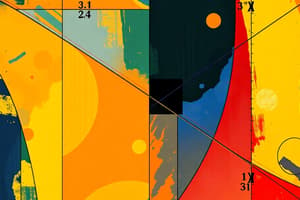Podcast
Questions and Answers
What does it mean for f to be continuous at x = a?
What does it mean for f to be continuous at x = a?
lim x→a- (f(x))=lim x→a+ (f(x)) = L and lim x→a (f(x))=(f(a))=L
What does it mean for f to be differentiable at x = a?
What does it mean for f to be differentiable at x = a?
f is differentiable at x = a and lim x→a- (f'(x))=lim x→a+ (f'(x))
What does it mean for f to be increasing on the interval (a,b)?
What does it mean for f to be increasing on the interval (a,b)?
f' > 0 on the interval (a,b)
What does it mean for f to be decreasing on the interval (a,b)?
What does it mean for f to be decreasing on the interval (a,b)?
What indicates that f has a critical point at x = a?
What indicates that f has a critical point at x = a?
What does it mean for f to have a relative minimum at x = a?
What does it mean for f to have a relative minimum at x = a?
What does it mean for f to have a relative maximum at x = a?
What does it mean for f to have a relative maximum at x = a?
What indicates that f is concave up on the interval (a,b)?
What indicates that f is concave up on the interval (a,b)?
What indicates that f is concave down on the interval (a,b)?
What indicates that f is concave down on the interval (a,b)?
What indicates that f has an inflection point at x = a?
What indicates that f has an inflection point at x = a?
What does it mean for f to have an absolute minimum at x = a?
What does it mean for f to have an absolute minimum at x = a?
What does it mean for f to have an absolute maximum at x = a?
What does it mean for f to have an absolute maximum at x = a?
What is the Intermediate Value Theorem regarding f(x) = k for some x on the interval [a,b]?
What is the Intermediate Value Theorem regarding f(x) = k for some x on the interval [a,b]?
What is the Mean Value Theorem regarding f'(x) = k for some x on the interval (a,b)?
What is the Mean Value Theorem regarding f'(x) = k for some x on the interval (a,b)?
What indicates that a particle is at rest at t = k?
What indicates that a particle is at rest at t = k?
What indicates that a particle changes directions at t = k?
What indicates that a particle changes directions at t = k?
What indicates that a particle is speeding up or slowing down at t = k?
What indicates that a particle is speeding up or slowing down at t = k?
Flashcards are hidden until you start studying
Study Notes
Continuity and Limits
- A function ( f ) is continuous at ( x = a ) if the limits from both sides and the function value at that point equal ( L ):
- ( \lim_{{x \to a^-}} f(x) = \lim_{{x \to a^+}} f(x) = f(a) = L )
Differentiability
- A function ( f ) is differentiable at ( x = a ) if derivatives from both sides at that point are equal:
- ( \lim_{{x \to a^-}} f'(x) = \lim_{{x \to a^+}} f'(x) )
Increasing and Decreasing Functions
- A function ( f ) is increasing on the interval ( (a, b) ) if its derivative ( f' > 0 ) throughout that interval.
- A function ( f ) is decreasing on the interval ( (a, b) ) if its derivative ( f' < 0 ) in that interval.
Critical Points
- A function ( f ) has a critical point at ( x = a ) if ( f'(a) = 0 ) or ( f' ) is undefined.
Relative Extrema
- A function ( f ) has a relative minimum at ( x = a ) if the derivative changes from negative to positive at that point.
- A function ( f ) has a relative maximum at ( x = a ) if the derivative changes from positive to negative at that point.
Concavity
- A function ( f ) is concave up on the interval ( (a, b) ) if the second derivative ( f'' > 0 ) throughout that interval.
- A function ( f ) is concave down on the interval ( (a, b) ) if the second derivative ( f'' < 0 ) in that interval.
Inflection Points
- A function ( f ) has an inflection point at ( x = a ) if ( f''(a) = 0 ) or undefined, and the second derivative changes signs.
Absolute Extrema
- A function ( f ) has an absolute minimum at ( x = a ) if it is a critical point with the lowest value compared to all critical points and endpoints.
- A function ( f ) has an absolute maximum at ( x = a ) if it is a critical point with the highest value compared to all critical points and endpoints.
Theorems
- Intermediate Value Theorem: If ( f ) is continuous on ( [a, b] ) and ( f(a) \leq k \leq f(b) ), there exists at least one ( x ) in ( [a, b] ) such that ( f(x) = k ).
- Mean Value Theorem: If ( f ) is continuous on ( [a, b] ) and differentiable on ( (a, b) ), then there exists at least one ( c ) in ( (a, b) ) such that the slope of the tangent equals the average rate of change:
- ( \frac{f(b) - f(a)}{b - a} = k )
Particle Motion
- A particle is at rest at time ( t = k ) if the velocity ( v(k) = 0 ).
- A particle changes direction at time ( t = k ) when the velocity changes signs.
- A particle is speeding up or slowing down at ( t = k ) depending on whether velocity and acceleration have the same or opposite signs, respectively.
Studying That Suits You
Use AI to generate personalized quizzes and flashcards to suit your learning preferences.




